2017-06-04
How should the Chinese TV industry achieve better cultural heritage and innovation after one year’s
The opening session of the 23rd Shanghai TV Festival (STVF) under the theme “Cultural Heritage and Modern Innovation— The Chinese Television Independent Innovation Summit” was held on the afternoon of June 13, hosted by the State Administration of Press, Publication, Radio, Film and Television (SAPPRFT) and the Shanghai Municipal People’s Government, and organized by the Shanghai Municipal Administration of Culture, Radio, Film & TV, the organizing committee of STVF and Shanghai Media Group. The new policy of independent innovation launched by SAPPRFT has been implemented for one year, and over 200 guests including government officials, leaders of TV stations, excellent program producers, experts in universities and colleges and representatives from domestic and foreign TV program production entities gathered in Shanghai to have in-depth discussions and exchanges on the cultural heritage and independent innovation for Chinese TV programs. Mr. GAO Changli, head of the publicity division of SAPPRFT, also attended the forum and delivered a speech.
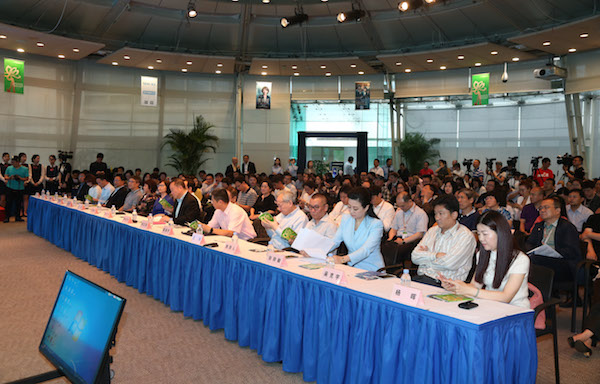
To promote independent innovation in Chinese TV programs, the SAPPRFT promulgated new management policies in June, 2016, which is viewed by Chinese TV industry as the first format year for “Chinese original variety shows”. Now a year has passed, and the guests not only demonstrated the encouraging results of the original variety shows on the forum, but also exchanged expertise and experience to help identify the direction for independent innovation and boost cultural confidence in “original Chinese works”.
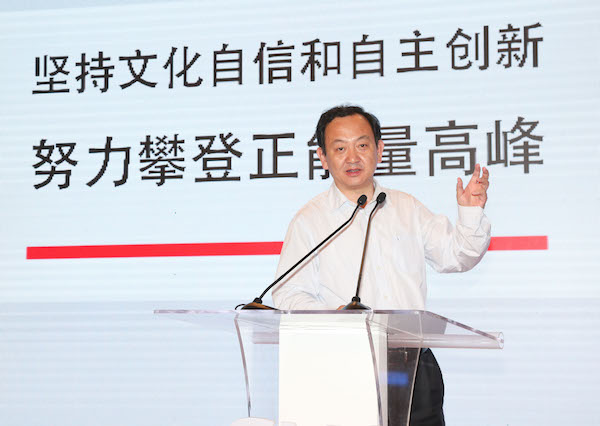
GAO Changli: Tell Chinese Stories Well and Uphold Chinese Spirits
In his address, Mr. GAO Changli, the head of the publicity division of SAPPRFT, said: “Nowadays, there are 3 main characteristics in Chinese programs, which are increasing attention to public welfare, popularity of cultural shows and fewer imported program formats.” Based upon the big picture of management, the SAPPRFT insists on the positive orientation, upholds Chinese spirits and provides better services to the people, which leads to more elements of public welfare. The rise of TV cultural shows brings such programs into spotlight including Chinese Traditional Poetry Show, Reader, Letters Alive and Chinese Classic poems and works. More and more Chinese original TV programs come into view while the imported formats have lost its market share due to SAPPRFT’s control of importing program formats from other countries. “To promote Chinese culture, creating original shows instead of importing formats is the only way out.”
Mr. GAO ended his speech by encouraging the industry:” China boasts good stories and the key lies in the competence to be a great storyteller. China also has completed many epic projects and the core is the ambition to create one.”
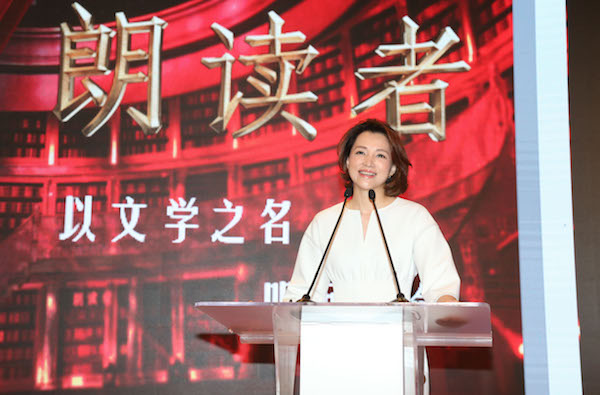
DONG Qing: The Reader was created in the first place “because the articles are there”.
DONG Qing, a CCTV (China Central Television) program producer, spoke first at the forum and shared her motivation for and experience in producing the program The Reader. She quoted the famous line “Because it’s there” of the renowned English mountaineer George Mallory to explain her motivation to produce the program The Reader, “because the articles are there” as she put it. She also mentioned that reading is a good way to convey emotions, and cultural heritage is something that cannot be overlooked by any country or people. What’s more, it is its obligation to.
Therefore, the idea of a TV reading show came to DONG Qing. Her team reached the consensus during the planning stage that “reading in a TV show is different from reciting at a theater, so insights play a key role in engaging people and striking a chord with them to the maximum extent possible.” She initially planned to choose all the guests from stars but later came to realize that “the moving point lies in the emotions aroused instead of fame. The reader himself is the article he reads, beautiful and thought-provoking.” She focused on the connection between the spirit of the article and the reader’s temperament in the article selection, which is the reason why “the articles written thousands of years ago are brought to life and resonate with the reader.”
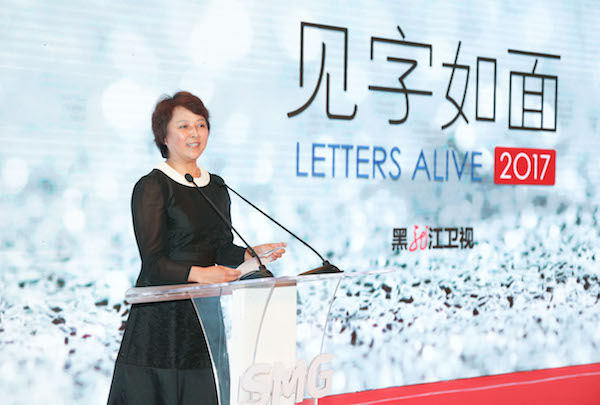
YANG Jing: Letters Alive opens the gate of history with letters
YANG Jing, head of Heilongjiang TV Station, shared her ideas about the program Letters Alive. Although there are some similarities between Letters Alive and The Reader in the format, Letters Alive “features just one table, one person and one letter without any shining stages or dazzling lights.” YANG Jing was inspired by the “letter”, an object carrying history, culture, thoughts and emotions, to make such a program, aiming at “opening the gate of history and Chinese stories with letters and savoring.
In the production, what YANG Jing values most are the attitude and warmth. As she put it, “Bring knowledge and culture back to TV programs and set up a unique style in the atmosphere of excessive entertainment.”
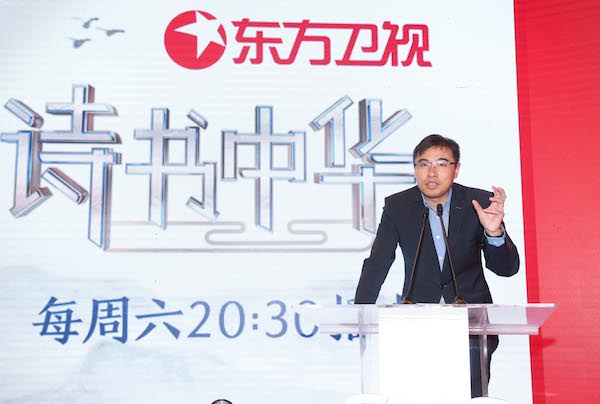
LI Yi: Chinese Classic Poems and Works contributes to growth of the inner world
As Dragon TV’s original cultural program, the Chinese Classic Poems and Works set the record of the highest audience rating among cultural programs on provincial satellite television channels this year. The party secretary LI Yi of Dragon TV of SMG shared the considerations behind the success. The two purposes of the show are “to show the breadth and depth of traditional Chinese culture” and “to encourage as many people as possible to get involved.”
The innovative format also leaves the audience a deep impression. For example, in the section Family Traditions, teams of two family members compete demonstrating good family traditions and mottos, and in the section Classics Interpreted, the classic poems and works are interpreted and creatively applied.
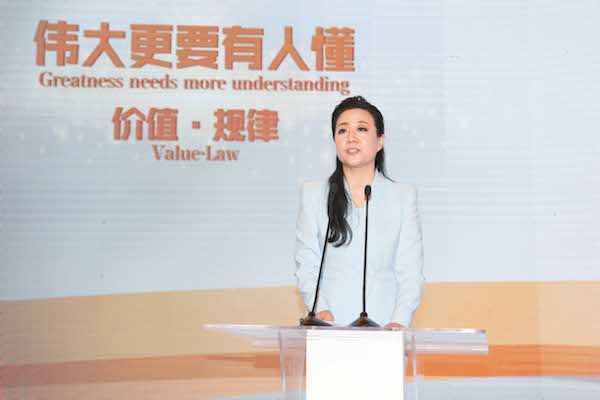
ZHANG Yimin: Insights in Books shows that Greatness needs more understanding.
Compared with other cultural programs, Insights in Books is more abstract and philosophical. However, its first season, The Reliable Marx, has unexpectedly gained a high audience rating and strong influence. ZHANG Yimin, the vice president of Inner Mongolia Radio and TV Station shared their experience in the promotion and distribution. The theme song, Marx Is Born in the ‘90s, is tailor-made for the first season, which portrays Marx from the standpoint of the generation born in the 1990s in rap style. Both the format and lyrics indicate that Marxism is always trendy and dynamic. The song went viral on the internet and was even covered by many foreign media, such as those from the US and Germany.
In regard of the reason for making a program centering on Marx, she believed that great as Marx is, “the great needs to be understood before it can be loved and pursued.” With this in mind, she introduced popular culture into the program so as to present a “true and interesting” Marx to the young, who is different from the image in textbooks or exam papers.
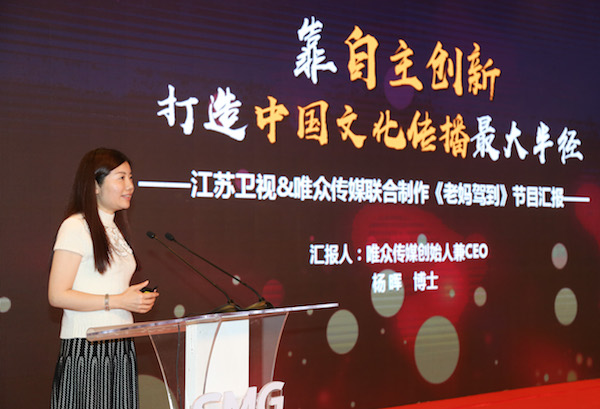
YANG Hui: Here Comes the Mother hits the pain point in Chinese intergenerational communication
Here Comes the Mother, an observation program blending the documentary with reality show, talks about intergenerational communication from a mother’s view, which is a brand-new experience for YANG Hui, CEO and founder of Vivid Media and her team. She sees the program as “The Truman Show”, which reflects the family, society, dream and reality in our time with “realistic topics, true stories and authentic feelings.”
To this end, the team selected 12 ordinary people out of 4000 who adapt to the society in varied ways, such as “a PhD selling cold noodles” and “a director seeking his career in Beijing”. The program explores the beauty and warmth of family love through their interaction with their mothers. At the same time, YANG Hui, who has been in the TV industry for over 10 years, expressed her strong support for the forum’s theme, saying “persevering in independent innovation is the only way to stay close to the audience”.
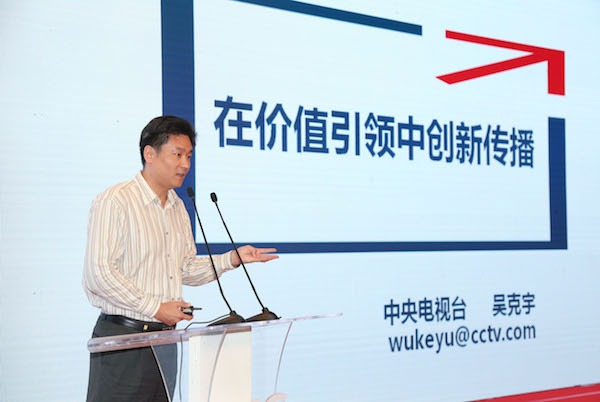
WU Keyu: Innovate information distribution during value-orientation
After the speeches of program representatives, Mr. WU Keyu, director of Program R&D Division, Chief Editor’s Office, CCTV, introduced the innovation features and trend in CCTV’s cultural programs as a whole.
In recent years, CCTV has been “promoting innovation and improvement in an all-round way” and focuses on 6 aspects in making cultural programs, which are “highlighting social values, centering on people’s concerns, pursuing true emotions, enhancing narrative, insisting on independent innovation and strengthening integrated communication”. As for communication, CCTV improves the top-level design, promotes in-depth integration and creates a virtuous cycle between televisions and mobile phones. Meanwhile, it also provides multiple interactive services such as the webcast, virtual seat and real-time comment.
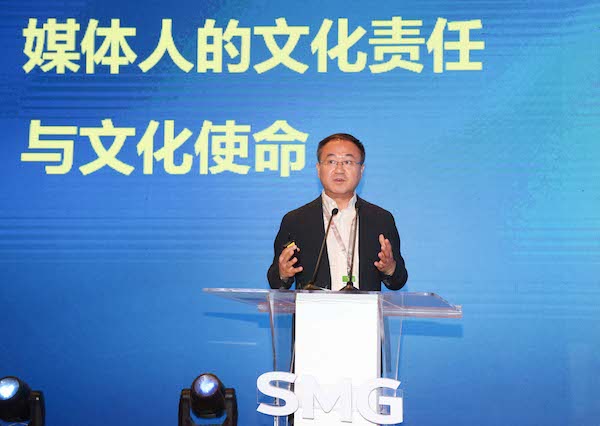
HU Zhengrong: How to realize cultural heritage and innovation
Mr. HU Zhengrong, president of the Communication University of China, talked on the theme of “Media’s Cultural Responsibility and Mission”. He said that to inherit and innovate positive traditional culture, the TV industry needs to retrieve the Chinese cultural cohesiveness, to rebuild the cultural attractiveness in international communication and the cultural credibility of TV programs.
Producers need to pay attention to 3 aspects in cultural heritage and innovation, which are rationalism instead of sensationalism, interactive communication instead of one-sided feeding of information and innovative conversion instead of simple reproduction. He believed that there was a promising future waiting ahead for cultural programs, and “Chinese traditional culture has weathered over a century’s rises and falls, and it remains at the core of our spiritual world.”

WANG Jianjun: Heritage and innovation needs inclusiveness and endeavor
The last guest speaker, Ms. WANG Jianjun, the president and head of Shanghai Media Group delivered a keynote speech “The Restart of History – Heritage and Innovation Rooted in Chinese Culture”. She said that the close relationship between China and the world is unprecedented. The Chinese people are enjoying the fruits of human civilization while contributing new ideas and wisdom to the international community. Against this backdrop, SAPPRFT enacts new policies on cultural heritage and innovation: history has not ended yet and the great practices of Chinese people are restarting the history.
Ms. WANG Jianjun summarized SMG’s practices and thinking in cultural heritage and modern innovation, and believed that “heritage and innovation needs inclusiveness and endeavor”. She said that while importing mature program formats, SMG paid more attention to the methodology so as to grasp the method and skill to produce original programs, to cultivate new ideas and to better tell Chinese stories with international languages. At the same time, they stick to the Chinese cultural core and tell Chinese stories in line with universal norms to promote Chinese programs.



